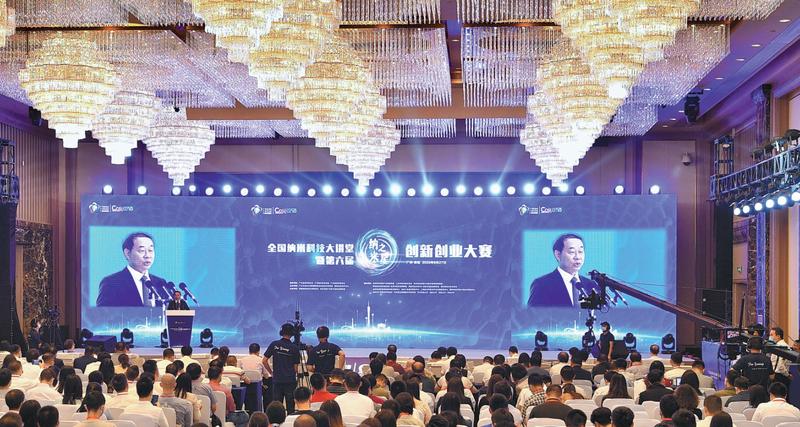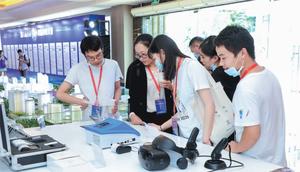 The sixth Nano Star innovation and entrepreneurship competition opens in Guangzhou High-Tech Industrial Development Zone, Guangdong province, on Monday. (JIA ZIHAO / FOR CHINA DAILY)
The sixth Nano Star innovation and entrepreneurship competition opens in Guangzhou High-Tech Industrial Development Zone, Guangdong province, on Monday. (JIA ZIHAO / FOR CHINA DAILY)
A total of six projects and six high-tech companies won prizes at the sixth Nano Star innovation and entrepreneurship competition on Monday in Guangzhou High-Tech Industrial Development Zone, Guangdong province.
The event was co-organized by the national nanotechnology innovation research institute of the Guangdong-Hong Kong-Macao Greater Bay Area and the National Center for Nanoscience and Technology, as well as authorities including the Department of Science and Technology of Guangdong, the Guangzhou science and technology bureau and the administrative committee of Guangzhou High-Tech Industrial Development Zone .
The winning projects covered a range of nano-related sectors including nano-optical devices, flexible graphene batteries, intelligent new materials and biological materials, according to organizers.
After several preliminary rounds, 29 projects competed in the final with nearly half of them related to new-generation information technology, organizers said.
The winners were assessed under the categories of technology, industrial value and commercial operation.
The event is aimed at discovering the latest innovations in nanotechnology and to promote the commercialization of nano-technological achievements, local officials said.
Among the winners was a holographic display project developed by a nanometer optical device team.
Started in April, the contest attracted more than 200 projects from all over the country.
This year, the event saw an increase in research results and products of key technologies including high-performance magnetic cores, organic semiconductors, high-energy-density storage materials and devices.
 Attendees view a range of Nano technology products at the sixth Nano Star innovation and entrepreneurship competition. (PHOTO PROVIDED TO CHINA DAILY)
Attendees view a range of Nano technology products at the sixth Nano Star innovation and entrepreneurship competition. (PHOTO PROVIDED TO CHINA DAILY)
More companies and startup businesses are making breakthroughs in core technologies and utilizing nanotechnology to develop industries, organizers said.
During the competition, a national nanotechnology lecture was held with academicians of the Chinese Academy of Sciences delivering speeches on topics including cultivating nano industrial leaders and the application of graphene and single-layer materials.
"With more than 20 years of development, China has seen great progress in the fundamental research of nanotechnology, with some sectors ranking top in the international arena," said Zhao Yuliang, director at the National Center for Nanoscience and Technology.
"However, there are still a number of research achievements that remain in papers and patents that have not been commercialized," Zhao said.
The future development of Chinese nanotechnology requires strengthened integration of fundamental research and industries, Zhao said.
The competition is an opportunity to encourage the commercialization and application of scientific results, he added.
It is the first time the Nano Star innovation and entrepreneurship competition has been held in Guangzhou High-Tech Industrial Development Zone.
The zone is home to a group of top research institutes and boasts strong research and development resources, said Li Xiaojun, director of one of the winning teams.
It has created strong and feasible policies for supporting the development of high technologies, Li said.
As of 2021, the event will be included in the China Innovation and Entrepreneurship Competition.
Last year, Guangzhou High-Tech Industrial Development Zone cooperated with the National Center for Nanoscience and Technology to launch the national nanotechnology innovation research institute of the Guangdong-Hong Kong-Macao Greater Bay Area.
Focusing on technological innovation, the institute is designed to be an international commercial base for nanotechnology and to promote the coordinated development of the upper, middle and lower reaches of the innovation chain.
In last December, the zone issued a guideline on promoting nano industry development via incentives to improve planning, industrial layout and attract more talents.


